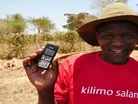Safe Farming: An innovation in technology

WRITTEN BY RICHARD CHOWNING
Africa's small scale farmers place all their hopes of harvest on rain. With the recent changes in weather patterns many of them have experienced low or no yields at all from hundreds of hours back aching labour in their fields. Some become discouraged and cultivate less of their land. That is all changing for a growing number of Kenyan farmers, thanks to an innovative insurance scheme called Kilimo Salama, which is Swahili for "safe farming".
The scheme is an example of the marriage of two essential components of modern development in Africa – technology and partnership.
Kilimo Salama is a crop insurance scheme put together by UAP Insurance Company of Kenya, Safaricom Ltd. (a telecommunications company), and two crop input providers, MEA Fertilizers and Syngenta Foundation for Sustainable Agriculture (a seed company). It covers farmers who grow maize, wheat, beans, sorghum and potatoes.
Overhead costs would normally prohibit insurance companies from offering small scale farmers crop coverage. Sending agents into the field to enrolfarmers, filling out and filing the paperwork, then resending agents into the field to complete and process claims would cost more than the $10 fee of the typical minimal coverage. With the mass availability of cell phones in Kenya and elsewhere in Africa they can now offer insurance that could very well increase production and income for the farmers.
READ MORE FROM AFRICAN BUSINESS REVIEW:
South Africa's dirty feet - counting carbon emissions
Traditional vs. new marketing methods
Changing the landscape of money transfers
In the Kilimo Salama pay as you plant system, a shop owner is supplied a cell phone. When a farmer buys seed or fertiliser and wishes to purchase insurance, the shop owner scans the barcode on the products, collects an additional 5 percent of the retail purchase and the seed and/or fertiliser company chips in another 5 percent. The payment is sent to the insurance company via the phone as well.
The weather situation is monitored by 40 small weather stations that Kilimo Salama has installed throughout Western Kenya and parts of the Rift Valley where the insurance is currently being offered. If rains fail, or are too great, payments are automatically made to account applications the farmers have installed on their cell phones.
As with all innovation, adoption of Kilimo Salama is slow, yet 25,000 Kenyan farmers have taken advantage of the system so far. There is a Swahili proverb that says "Baada ya dhiki faraja" (which means “After hardship, comes relief”). And so it did for 1,400 farmers who received payouts in 2011 when the rains were not sufficient in their areas.
Richard Chowning has spent 40 years working in and advocating for the peoples of Africa. He owns and writes for six Africa oriented websites including Africa Missions Resource Center.
African Business Review is now available on the iPad. Click here to download it.
- Safaricom/Vodacom: joint venture to expand M-PESA in AfricaLeadership & Strategy
- Safaricom celebrates 19th year with new customer-centric strategyLeadership & Strategy
- New free learning platform for Kenya youths launched by Blaze, SafaricomTechnology
- The end of an era: Safaricom giant Robert Collymore dies aged 61Leadership & Strategy



